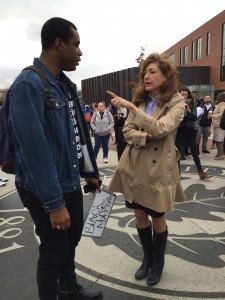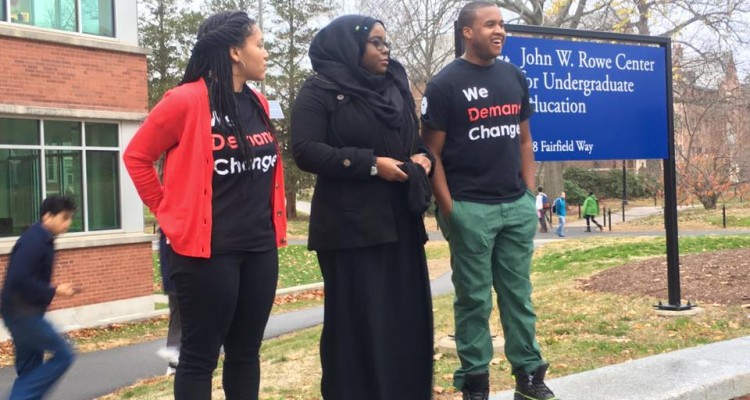By Máiréad Loschi
Audio Player
Students from the University of Connecticut gathered at the seal on Fairfield Way Friday to show solidarity with protesters at the University of Missouri.
Students at the University of Missouri are protesting racial tensions, which have led to the resignation of the university’s president.
The event at UConn was prompted and inspired by the student activism spreading on college campuses across the nation, including Mizzou, Ithaca, and Yale.
“So many students throughout the nation were gaining this courage and inspiration to rise up and demand exactly what they should be guaranteed. I think that spoke to me a lot,” said Julian Rose, a senior who co-organized the event with fellow students Haddiyyah Ali, Genesis Quiles-Galarza, Charity Whitehead, and Nicole Simonsen.

President Herbst spoke with students about racism and intolerance prior to the speak out demonstration.
Ali, a sophomore majoring in Political Science and Africana Studies, cited UConn’s recent activism as inspiration for the event.
“Last year was my freshman year and I watched so much activism happen on campus, i watched so much initiative and so much determination on behalf of my peers. I felt I was cultivated in a space of determination and a space that wanted to have real change,” she said.
The event was two-part, beginning with a “speak-out” and continuing later with a march around campus. The crowd was a mix of undergraduate and graduate students, professors, activists, and administration.
UConn President Susan Herbst attended the event. She spoke to organizers and students prior to the speak-out demonstration.
“I think the more talk we have is better, the more people tell their stories about racism, about bigotry, intolerance, the better,” said Herbst.
Herbst cited the recently released UConn Diversity report as an example of steps the administration is taking in addressing the issues of racism and intolerance on campus.
Some speakers later expressed frustration with the administration, questioning whether the resignation of Mizzou President, Tim Wolfe, was the motivating factor behind President Herbst’s attendance.
Ali said there is a space for intersection between student activism and the role of the administration in addressing diversity on campus.
“We’re not here to reinforce this dichotomy of administration versus students,” she said. “What we’re trying to do is bring them into this space to hear our pain and hear our very raw stories and institutionalized violence. And to take that back with them not as an attack, but as something they can be thinking about.”
The speak-out event provided a safe space for sharing hurt, acceptance, performances, and art. Many members of poetic release delivered powerful and meaningful spoken word.
Several faculty members spoke about the importance of protest and solidarity. Students expressed their personal experiences.
As some students gathered to speak-out, another student on campus took to Yik Yak, to anonymously express their views. A post on the social media app read, “okay you blacks had your fun. Now let’s switch on over to the real issue. We need to stop the Syrian WARLOCKS from coming in.”
Omar Allam, a senior, expressed his hurt and frustration in response to this comment.
“Hatred is amongst us guys. This hurts me. Look around you; there is racism there,” he said.
This post directly contrasted with the diverse and accepting environment demonstrators called for at the event.
Rose is optimistic about future change.
“There’s potential for us to be better,” he said. “I have a lot of hope. I think that in spreading that love and spreading that support is one of the most powerful things we can do.”


